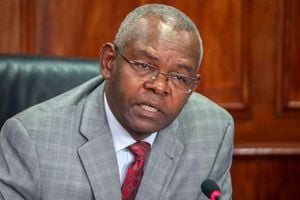
National Assembly’s Finance committee chairperson Kuria Kimani (left) with Central Bank Governor Kamau Thugge in Nairobi on August 21, 2024.
Central Bank Governor Kamau Thugge is expected before a parliamentary committee on Wednesday to submit contract and tender documents for the Sh14.2 billion money printing deal awarded to a German firm that is no stranger to controversy.
The National Assembly’s Finance committee demanded full disclosure on the deal after CBK invoked the classified procurement process to award Giesecke+Devrient Currency Technologies CmbH the deal to print new Kenya bank notes.
CBK has explained that it resorted to the German company after De La Rue Kenya Ltd, a British firm that the Kenyan government has a 40 per cent stake in, closed its Nairobi plant.
The committee chaired by Molo MP Kimani Kuria has demanded a certified copy of the signed five-year contract, Cabinet memo on the request for classified procurement and approval by Cabinet.
MPs also want the request memo to the National Security Council, the approval of the council, the legal opinion of the Attorney-General and advisories from the Public Procurement Regulation Authority and National Treasury.
CBK is also required to submit a report from the user department showing the status of the currency notes presented to the board, minutes of the meeting that authorised the procurement, tender documents, a list of firms that were considered, the amounts each firm bid, tender evaluation report and process that led to the award.
Further, the MPs have demanded a certified copy of the communication from De La Rue Kenya notifying CBK of the intention to halt operations in Kenya.
Giesecke & Devrient eventually bagged the Kenyan currency tender this year after losing another lucrative tender to De La Rue rival in 2006.
CBK had floated an open tender in January 2005 for the printing of 1.71 billion pieces of bank notes. The tender attracted five bidders — Giesecke & Devrient, De La Rue, Orell Fussli (Switzerland), Francois Chades Oberthur Fiduciaire (France) and Job Enschede Banknotes (Holland).
However, the entire tender was cancelled on June 6, 2005 due to various anomalies and fresh tendering carried out. De La Rue bagged the contract on May 4, 2006 at a total cost of $51,195,840. The only other firm to get to the final stage of the tender was Giesecke & Devrient, which quoted $76,331,500
Four years prior to competing for the Kenyan tender, the family-owned German company had been caught up in a scandal back at home.
In January 2002, millions of 100 euro notes that had been produced by the company were shredded due to a misprint.
According to the BBC, the company misprinted a security feature designed to stop forgers from using photocopiers to make fakes of the new currency.
“The fault was spotted only after Giesecke & Devrient had delivered 325 million of the 100 euro notes to Germany’s central bank, the Bundesbank,” the BBC reported.
According to the publication, the issue was not a design flaw, but a mistake by the printers. Euro notes produced by other printing plants across the eurozone were not affected.
In 2008, the Munich-based company stopped supplying banknote paper to the Reserve Bank of Zimbabwe following pressure from the German government, which demanded that it stops working with the country then led by President Robert Mugabe.
At the time the company had been criticised for supplying bank notes to Zimbabwe and basically making Mugabe’s hyperinflationary economic practices possible. It is then that the company stopped shipments of notes to the country.
Apart from Germany, the United Nations and European Union had also cautioned the company from working with Mugabe.
In an official communication, the company said that it was subject to strict rules that are defined by the World Bank in delivering banknotes and paper, and it was continuously relying on the political and moral assessment provided by the international trade regulators.
“Our decision is a reaction to the political tension in Zimbabwe, which is mounting significantly rather than easing as expected, and takes account of the critical evaluation by the international community, German government and general public,” Karsten Ottenberg, the chairman of the company’s management board and CEO, said.
Earlier, in 1995, the money printing firm had been accused of inflating the price of its banknotes by making a dye (used in printing ink) 70 per cent more expensive than the normal price.
Trade Practices said that it all started when a partner company in Switzerland bought the dye from Giesecke & Devrient, raised its price and then sold it back to the German firm, which saw the price rise even higher.
Giesecke & Devrient was started in June 1, 1852 by 21-year-old Hermann F. Giesecke and Alphonse Devrient, 31. On its website, the company says that it was started in Leipzig and within a short time the partners had made it big as it became a leading money printer.
It states that some of the groundbreaking inventions that saw it go up the ladder include anti-counterfeiting and printing technology.
The firm has different divisions that handle banknotes, smart cards, cash handling systems, identification systems, securities printing and e-payment systems.
When it was started, the company handled half of Germany’s currency production from 1958. In 1991, the firm produced the first SIM card. To date it also produce chip passports and smart cards.






